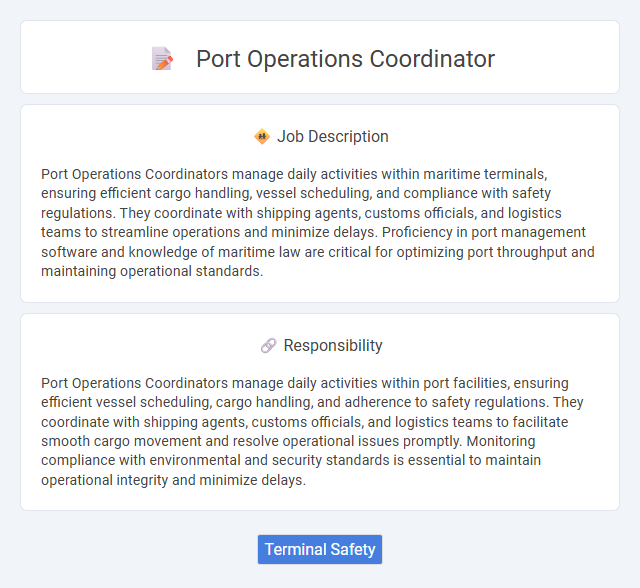
Port Operations Coordinators manage daily activities within maritime terminals, ensuring efficient cargo handling, vessel scheduling, and compliance with safety regulations. They coordinate with shipping agents, customs officials, and logistics teams to streamline operations and minimize delays. Proficiency in port management software and knowledge of maritime law are critical for optimizing port throughput and maintaining operational standards.
Individuals who are detail-oriented and can handle high-pressure environments will likely be well-suited for a Port Operations Coordinator role. Those with strong organizational skills and the ability to coordinate multiple tasks simultaneously may find this job aligns with their strengths. However, individuals who prefer solitary work or struggle with fast-paced decision-making might find this position challenging.
Qualification
A Port Operations Coordinator must possess a strong background in maritime logistics, typically requiring a bachelor's degree in supply chain management, maritime studies, or a related field. Proficiency in port management software, excellent communication skills, and in-depth knowledge of shipping regulations and customs procedures are essential for efficient coordination. Experience in project management, problem-solving abilities, and the capability to work under pressure are highly valued qualifications in this role.
Responsibility
Port Operations Coordinators manage daily activities within port facilities, ensuring efficient vessel scheduling, cargo handling, and adherence to safety regulations. They coordinate with shipping agents, customs officials, and logistics teams to facilitate smooth cargo movement and resolve operational issues promptly. Monitoring compliance with environmental and security standards is essential to maintain operational integrity and minimize delays.
Benefit
A Port Operations Coordinator role likely offers the benefit of enhancing organizational and logistical skills through managing the flow of cargo and coordinating with multiple stakeholders. Employees probably gain valuable industry experience in maritime operations, contributing to career growth in supply chain or transportation sectors. The position may also provide opportunities for teamwork and problem-solving in a dynamic, fast-paced environment.
Challenge
Managing complex logistics and coordinating multiple stakeholders in port operations likely presents significant challenges that require strong problem-solving skills. The role probably demands the ability to handle unexpected delays, equipment malfunctions, and regulatory compliance with precision. Balancing efficiency and safety is expected to be a constant challenge in ensuring smooth port functioning.
Career Advancement
Port Operations Coordinators gain valuable experience managing vessel schedules, cargo handling, and logistics coordination, which builds a strong foundation for leadership roles in maritime management. Career advancement opportunities include progressing to positions such as Port Manager, Shipping Operations Manager, or Terminal Superintendent, where strategic decision-making and operational oversight are key responsibilities. Specialized certifications in port logistics and supply chain management further enhance promotion prospects and salary potential.
Key Terms
Terminal Safety
Port Operations Coordinators play a critical role in maintaining terminal safety by overseeing the safe handling of cargo and ensuring compliance with maritime safety regulations. They conduct regular risk assessments, coordinate emergency response protocols, and supervise staff adherence to safety procedures to minimize accidents and environmental hazards. Effective communication with vessel crews, terminal workers, and regulatory bodies ensures smooth operations while upholding strict safety standards.
 kuljobs.com
kuljobs.com